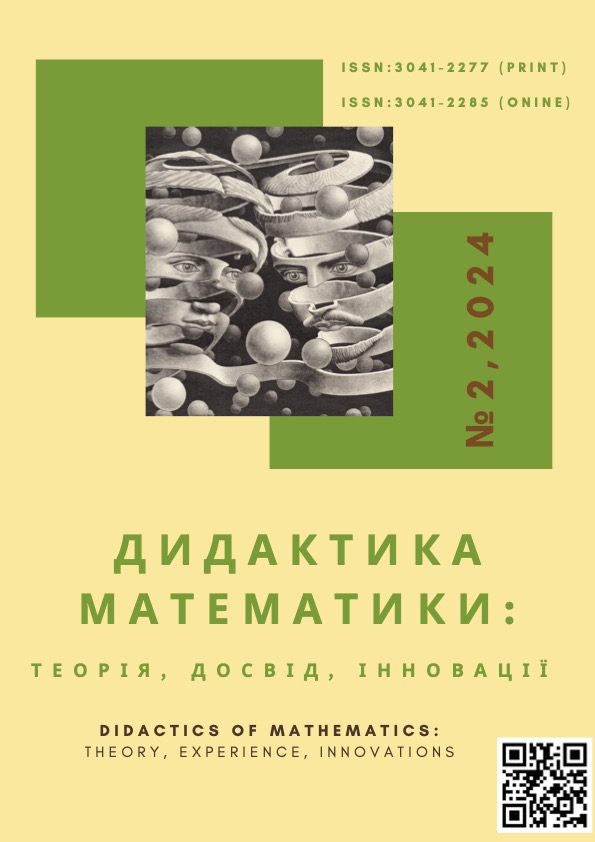Theory and practice of formative assessment in geometry lessons: a review of foreign publications
https://doi.org/10.31652/3041-2277-2024-2-70-81Published 2024-12-26
Keywords
- feedback,
- student motivation,
- student achievement in mathematics,
- formative assessment,
- assessment for learning
- self-regulated assessment ...More
Copyright (c) 2024 Діана Тютюнник

This work is licensed under a Creative Commons Attribution 4.0 International License.
How to Cite
Abstract
Formative assessment plays an important role in modern education. Formative assessment is an assessment that takes place throughout the learning process. Therefore, teachers have an important role to play in mastering appropriate approaches to formative assessment. According to previous research, some teachers are unable to understand the role of formative assessment in learning, which prevents them from using it effectively in the classroom. Because of this problem, many researchers have conducted studies related to the practice of formative assessment in schools.
The article discusses the problem of formative assessment, which is becoming increasingly relevant in the world and Ukrainian pedagogical practice, in particular in the context of teaching geometry. Formative assessment, which was developed in the second half of the twentieth century, involves not only testing knowledge, but also providing constructive feedback aimed at adjusting the learning process. The article analyses the results of foreign studies that show the positive impact of formative assessment on students' academic performance, development of critical thinking, motivation and independence. The article emphasises the need to integrate this approach into mathematics teaching in Ukraine, taking into account foreign experience. Particular attention is paid to the psychological aspects of implementing assessment and the use of new technologies to improve learning.
Formative assessment is seen as a tool that adapts to the individual needs of students, stimulates self-regulation, and promotes a deeper understanding of geometric concepts.
Downloads
References
- Andrade, H. L., & Brookhart, S. M. (2020). Classroom assessment as the co-regulation of learning. Assessment in Education: Principles, Policy & Practice, 27(4), 350–372. https://doi.org/10.1080/0969594X.2019.1571992
- Assessment for Learning: 10 principles. Research-based Principles to Guide Classroom Practice. Oxford: Assessment Reform Group, 2002. 3 p. https://www.storre.stir.ac.uk/bitstream/1893/32458/1/Assessment%20for%20learning%2010%20principles%202002.pdf
- Beesley, A., Clark, T., Dempsey, K., Tweed, A. (2018). Enhancing formative assessment practice and encouraging middle school mathematics engagement and persistence. School Science and Mathematics, 118(1–2), 4–16. https://doi.org/10.1111/ssm.12255
- Black, P., William, D. (1998). Assessment and Classroom Learning. Assessment in Education: Principles, Policy & Practice, 5(1), 7–74. https://doi.org/10.1080/0969595980050102
- Black, P. J., & Wiliam, D. (1998b) Inside the black box: raising standards through classroom assessment. Article in Phi Delta Kappan, 139-148. http://edci770.pbworks.com/w/file/fetch/48124468/BlackWiliam_1998.pdf
- Bloom, B. (1968). Learning for mastery. Evaluation Comment, 1(2), 1–12. http://files.eric.ed.gov/fulltext/ED053419.pdf.
- Bloom, B., Hastings, T., Madaus, G. (1971). Handbook on formative and summative evaluation of student learning. New York: McGraw-Hill, 923 p.
- Boaler, J. (1998). Open and closed mathematics: Student experiences and understandings. Journal for research in mathematics education, 41-62.
- Briggs, D., Ruiz‐Primo, M., Furtak, E., Shepard, L., Yin, Y. (2012). Meta‐analytic methodology and inferences about the efficacy of formative assessment. Educational Measurement: Issues and Practice, 31(4), 13–17. https://doi.org/10.1111/j.1745-3992.2012.00251.x
- Butler, R. (1987). Task-involving and ego-involving properties of evaluation: Effects of different feedback conditions on motivational perceptions, interest and performance. Journal of Educational Psychology, 79, 474-482.
- Cisterna, D., Gotwals, A. (2018). Enactment of ongoing formative assessment: Challenges and opportunities for professional development and practice. Journal of Science Teacher Education, 29(3), 200-222. https://doi.org/10.1080/1046560X.2018.1432227
- Elawar, M. C., & Corno, L. (1985). A factorial experiment in teachers' written feedback on student home-work: Changing teacher behavior a little rather than a lot. Journal of Educational Psychology, 77(2), 162-173.
- Hattie John & Helen Timperley (2007). The Power of Feedback. Review of Educational Research, Vol. 77, No. 1, 81-112. DOI: 10.3102/003465430298487 Retrieved from https://www.columbia.edu/~mvp19/ETF/Feedback.pdf
- Hattie John (2012). Visible Learning for Teachers: Maximizing Impact on Learning. The Main Idea (current education book summaries) http://surl.li/cudpuk
- Heritage, M. (2010). Formative Assessment: Making It Happen in the Classroom. Thousand Oaks, CA: Corwin Press.
- Kohn, A. (2011). The case against grades http://www.alfiekohn.org/article/case-grades/
- Kingston, N., Nash, B. (2011). Formative assessment: A meta-analysis and a call for research. Educational Measurement: Issues and Practice, 30(4), 28–37. https://doi.org/10.1111/j.1745-3992.2011.00220.x
- Lane, R., Parrila, R., Bower, M., Skrebneva, I. (2019). Formative Assessment Evidence and Practice: Literature Review. AITSL. Melbourne.
- McDermott, R. (1993). Understanding practice: The acquisition of a child by a learning disability. Journal of Educational Psychology. https://courses.cs.washington.edu/courses/cse590w/06au/resources/mcdermott-93.pdf
- OECD (2005). Formative assessment: improving learning in secondary classrooms. OECD Publishing. https://learningportal.iiep.unesco.org/en/library/formative-assessment-improving-learning-in-secondary-classrooms
- Pellegrino, J. W., Quellmalz, E. S. (2010). Perspectives on the Integration of Technology and Assessment. Journal of Research on Technology in Education. Volume 43, Number 2, 119-134. https://files.eric.ed.gov/fulltext/EJ907019.pdf
- Scriven, M. (1963) "The methodology of evaluation" https://www.scribd.com/doc/283341599/Scriven-The-Methodology-of-Evaluation-1967
- Torulf Palm, Catarina Andersson, Erika Boström & Charlotta Vingsle (2017). A review of the impact of formative assessment on student achievement in mathematics. Nordic Studies in Mathematics Education, 22 (3), 25–50. https://ncm.gu.se/wp-content/uploads/2020/06/22_3_025050_palm.pdf
- Закон України «Про повну загальну середню освіту» (2020). https://zakon.rada.gov.ua/laws/show/463-20#Text
- Локшина О. (2009). Інновації в оцінюванні навчальних досягнень учнів у шкільній освіті країн Європейського союзу. Порівняльно-педагогічні студії. № 2. С. 107–113. DOI: https://doi.org/10.31499/2306-5532.2.2009.18073
- Матяш О.І. (2012). Актуальні проблеми формування методичних компетенцій майбутніх учителів математики. Сучасні інформаційні технології та інноваційні методики навчання в підготовці фахівців: методологія, теорія, досвід, проблеми. №33.404-406.
- Матяш О.І. (2013). Теоретико-методичні засади формування методичної компетентності майбутнього вчителя математики до навчання учнів геометрії: Монографія / Вінниця: ТОВ «Нілан-ЛТД», 2013. - 450 с.
- Матяш О.І., Тютюнник Д.О. (2019). Проблема визначення критеріїв та показників математичних компетентностей набутих учнями у процесі навчання геометрії. Физико-математическое образование, №2 (20). 89-93. http://dx.doi.org/10.31110/2413-1571-2019-020-2-014
- Михайленко, Л. Ф. (2022a). Реалізація принципу наступності при впровадженні формувального оцінювання навчальних досягнень учнів з математики. Наступність у навчанні математики в умовах реформи загальної середньої освіти: реалії та перспективи, 89–90. http://dspace.pdpu.edu.ua/jspui/bitstream/123456789/16606/3/Continuity%20in%20teaching%20mathematics.2022.pdf
- Михайленко, Л. Ф. (2022b). Сучасні підходи до впровадження формувального оцінювання на уроках математики. Фізико-математична освіта, 37(5), 43–49. https://doi.org/10.31110/2413-1571-2022-037-5-006

